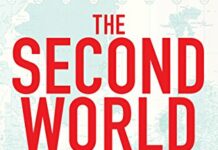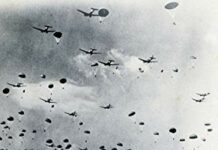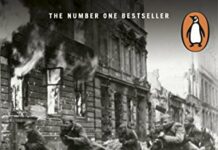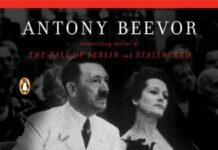
Ebook Info
- Published: 2006
- Number of pages: 592 pages
- Format: PDF
- File Size: 5.14 MB
- Authors: Antony Beevor
Description
A fresh and acclaimed account of the Spanish Civil War by the bestselling author of Stalingrad and The Battle of Arnhem To mark the 70th anniversary of the Spanish Civil War’s outbreak, Antony Beevor has written a completely updated and revised account of one of the most bitter and hard-fought wars of the twentieth century. With new material gleaned from the Russian archives and numerous other sources, this brisk and accessible book (Spain’s #1 bestseller for twelve weeks), provides a balanced and penetrating perspective, explaining the tensions that led to this terrible overture to World War II and affording new insights into the war-its causes, course, and consequences.
User’s Reviews
Editorial Reviews: Review This book is destined for the first rank of general histories of the [Spanish] Civil War. (Santos Juliß, El Pafs) About the Author Antony Beevor was educated at Winchester and Sandhurst. A regular officer in the 11th Hussars, he served in Germany and England. He has published several novels, and his works of nonfiction include The Spanish Civil War; Crete: The Battle and the Resistance, which won the 1993 Runciman Award; Stalingrad: The Fateful Siege: 1942—1943; and Berlin: The Downfall, 1945. With his wife, Artemis Cooper, he wrote Paris: After the Liberation: 1944—1949. His book Stalingrad was awarded the Samuel Johnson Prize for Non-Fiction, the Wolfson History Prize, and the Hawthornden Prize in 1999.
Reviews from Amazon users which were colected at the time this book was published on the website:
⭐I can’t say I can add much to the collective opinion of previous reviewers so I’ll confine myself to a complaint about the Kindle edition: to receive 5 stars it would have needed to add the names of significant people and places to the dictionary so they can be brought up by a single touch; for 4-stars I would expect links to notes and references; you can’t get 3 stars with so many typos and garbles, even if many of them are of Spanish names; hence two stars.
⭐”The Spanish Civil War is one of the comparatively few cases when the most widely accepted version of events has been written more persuasively by the losers of the conflict than by the winners.”With that comment in “The Battle for Spain,” a revised update of his 1982 history of that war, Antony Beevor (“Stalingrad”; “The Fall of Berlin, 1945”), effectively describes the state of its English-language documentation. This has been, essentially since Franco’s victory in 1939, largely the preserve of Hugh Thomas and Paul Preston, both thoroughly competent historians, but each (particularly in the case of Thomas) a strong partisan of the Republican cause.Thomas’ encyclopedic “The Spanish Civil War” (1961, with revisions) is the benchmark English-language history of the War. However, in a comparison between the two works, Beevor’s account scores highly. Thomas was–and even after three updates of his history remains–an unabashed apologist for the Republic and (particularly) the International Brigades. His accounts are formidable if for no reason other than the numerous footnotes that begin with the words, “conversation with….” Thomas writes as a confidant of many–if not most–of the leading figures of the Spanish Republic. Too often, however, it appears to a reader that his acceptance of their assertions was uncritical.Beevor does not rely on Thomas’ extensive network of firsthand witnesses, but this does not seem to be a disadvantage. (As a practical matter, the lack of such personal contacts reduces the incentive to write with one hand while holding an axe to a grindstone with the other.) While he examines in detail the political history and development of each of the warring factions–and subfactions, of which there were many, particularly on the Left–his is not a portrait in black and white. Rather, it compels the conclusion that neither Franco and the Spanish Foreign Legion nor Negrín and the International Brigaders were paragons of virtue. He addresses a clash of fundamental values and equally fundamental hatreds, demonstrating, to the extent that it is possible to draw a balance at all, that the quantum of evil on each side was approximately equal.His accounts of the battles, from the initial skirmishes to the fall of Barcelona and the final defeat of the Republic by the Nationalists at the Ebro, are refreshingly lucid because they generally avoid extensive descriptions of small-unit attacks and defenses in favor of broader overviews of the individual campaigns and their outcomes. (Of course, as a military historian, Beevor knows what air and ground combat forces actually do.)Particularly worthwhile are the detailed analyses of the successes and failures of the foreign participants: Hitler’s “Legion Condor,” Mussolini’s varied blackshirt and army elements, and Stalin’s tankers and fliers. (Beevor is at one with Thomas and Preston in providing an annihilating assessment of Mussolini’s wasteful and inept involvement.)In addressing the uneven performance of the International Brigades (and the dictatorial controls exercised by their political commissars), Beevor’s account is more realistic–and less romantic–than those of such famous-but-dilettantish bit-players as Ernest Hemingway, André Malraux, and Stephen Spender.He examines in some detail the internal left-right conflicts within the Falange, a party generally–and erroneously–viewed as both monolithic and a slavish imitation of the Nazis. In this connection, however, it would have been helpful had he explored more extensively the Falange as José Antonio Primo de Rivera, the original party chief, had envisioned it: as the true “nationalist-socialist” party that the Nazis never truly succeeded in becoming.(The word “Nazi,”–pronounced “nahtzi” in German as well as American-English–is the German contraction of “Nationalsozialist.” The “national” in that context is best translated as “nationalist.”)Put another way, José Antonio was no fascist. (Nor, for that matter, was Franco.)Beevor also rehabilitates to some extent Manuel Hedilla, the “left-wing” Falangista who assumed control over the party after the November 1936 murder of José Antonio by the Republicans in the prison of Alicante. He describes Hedilla’s condemnation as a result of a speech on Christmas Eve of 1936 condemning indiscriminate attacks on citizens who had voted for the Republic, explaining that many had done so merely out of “hunger and despair,” and noting that there were “right-wingers worse than the `Reds.'” (That, of course, earned him the implacable–and permanent–enmity of Franco.)Particularly valuable is his painstaking disentanglement of the fragmented and complicated components–PCE, FAI, POUM, PSOE, UGT, and others–that at various times and with varying degrees of competence influenced the internal politics of the Republic. He goes into considerable detail in describing the steadily increasing control of the PCE, the Partido Comunista de España, over the government and politics of the Republic.He complements that with a summary of the (far less complicated) Nationalist structure: Conservatives allied with the monarchist Carlists, an alliance championed by generals Franco, Quiepo de Llano, Mola, and the enigmatic Juan Yagüe, a “left-wing” [i.e., a more-or-less moderate-socialist] Falangist whom few would, then or now, associate with any degree of moderation. (At the end of the war, instead of naming Yagüe Minister of War, a position for which he was uniquely qualified, Franco, who never forgot anything he perceived as evidence of political unreliability, shunted him off to the meaningless job of Minister of Aviation.) “The Battle for Spain” is not an evening’s reading, and is probably not for beginners. It nonetheless provides a new and valuable perspective on a conflict that was in so many grim ways a rehearsal for World War II.
⭐Having heard stories of the Spanish Civil War from my father who was a merchant marine officer and had his ship stopped frequently and raided for cigarettes, I’ve always been intrigued by the personalities involved in the war. Anthony Beevor’s book is most certainly the best book I’ve read written on this conflict. It lays excellent historical context and provides interesting political analysis and information derived from Nazi and Soviet sources.Most books on this conflict are written from a pro-Republican perspective. I have yet to read one from a full Francoist viewpoint. Beevor’s writing is generally evenhanded but he certainly devotes more time in the book to Republican matters. This may be due to his sources but there were a few instances where I felt he clearly sympathized with the Republicans.Beevor writes clearly about the human aspect of all the parties involved and their desires for a better life for themselves, their families and their national/regional loyalties. While each regional group within Spain clearly had their loyalties to their state, I never got the feeling they did not consider themselves Spanish. And there lies the tragedy of this and all civil wars. When civil discourse breaks down and armed conflict begins, there are no winners.A few things stood out for me. They are observations that I think have near universal application in our world. First I appreciate all the more the religious freedom we have in the US. Regardless of your viewpoint, faith or non-faith, the Spanish Civil War highlights the evils of state religion and the oppression that can result. Secondly, the war demonstrated how the politicalization of classes, outside of one’s culture, is dangerous. Ethnic diversity that does not blend into and impact the dominant culture, but chooses to remain separate, breeds extremists. Thirdly, it demonstrated how political reforms that seek to reverse injustices or inequities done without consideration for political dialog and most importantly; time, are doomed to fail. Fourth, it demonstrated the need for people to carefully consider giving their allegiance to a political party or a bunch of power-hungry people. Charismatic political leaders tend to be dangerous. Lastly, people desire to be self-determining and free to make decisions without outside influence. History clearly validated Spain’s desire to be a proud and self-determining people through its non-violent radical transformation from authoritarianism to parliamentary Republic.From a political standpoint, I was intrigued by the Soviet advisors whose quest for power always seemed to end in their demise. Sometimes it seemed safer to be on the battlefield than an adviser to Stalin. In the end, I think the Republican’s lost the war largely because of their over-reliance on Stalin and their fractured ideology. Without Germany and Italy’s assistance to Franco, they probably would have. Clearly they were outgunned by the Nationalists, but the incompetence of Stalin’s political officers on the ground and their selfish motives seemed to create confusion and chaos that helped splinter the military command and any national will to win the war.The book is very engaging and I could not put it down. My only difficulty reading came from the fact the book is filled with European “alphabet soup” that made it hard to follow. Europe has a long history of using abbreviations for political parties and their associated wings. The author provided an index of abbreviations and terms and I found myself flipping back and forth (which is a little harder on the Kindle which I used to read this book) However, at times I found myself lost as to what side he was referring to(Republican or Nationalist) in the narrative.I mentioned this book as prophetic in my title. I kept thinking of the political polarization of my own country, the propaganda and class warfare being played by the two main political parties and the willingness of the people to place their hopes in politicians. I see great similarities in the rhetoric today as is expressed in this book. We fought a civil war 125 years ago and it’s my hope that anyone who reads this book will use it as a motivation to reflect on what can happen when we ratchet up the divisiveness and place our hope in a charismatic leader to save us.
⭐The Spanish Civil War is one of those conflicts that seems to have become overlooked because of its proximity to a much larger one. Indeed, the argument can be made that World War II really started in Spain, not least by being a proving ground for new Luftwaffe aircraft and the first usage of the shock assault tactics that the world would later come to know as blitzkrieg.If you have read the author’s other books, note that this one does not make for such easy reading because of the complexity of the conflict, with each side being made up of multifarious factions, and having varied supporters and sponsors (both covert and overt). As a consequence, the cast is a large one, and to the non-Spanish speaker some of the names do sound very similar. Also, although it is essential to understand the events of the previous decades that led to war, this does not make for the most gripping reading material, even in the hands of such an accomplished author.However, the results more than justify any effort needed by the reader to persevere. Ultimately, you get a very clear picture of a vicious conflict that not only blighted Spain for several decades, but had momentous consequences for the entire world. And as well as describing the bigger strategic picture, the author does not neglect to give proper coverage of the huge amount of individual suffering that inevitably took place.So if, like me, you knew little of the Spanish Civil War, read this book (at a measured pace) and let Anthony Beevor enlighten you in what may well be the definitive history of an oft-overlooked war.
⭐This is a very impressive book Anthony Beevor explains in detail the history of Spain from the 18 hundreds so you understand who Spain works on a political and religious level Then he starts to tell the story of the spanish civil war This book covers every aspect of the war You see the Germans and the Italians contribution to the war Also the Russians contribution all in stunning detail You read about the international units and the barbarity on both sides The victims were the spanish civilians mostly The level of cruelty is shocking The Nazis gained the most out of the war they tested their weapons Even trying a crude form of napalm You hear about gurinica which was not the worst thing done in the cival war The conclusion is both sides were no better than the other Well worth reading I knew very little about this subject until I read this This is the only book on the spanish cival war you need It’s so well written and researched
⭐A great read, an excellently presented book. It cuts to the chase of an entangled web of events and presents great clarity and understanding of a very complicated and sorry event in history. Beevor has produced a top class account of the unfolding myriad of events, players and the litany of good and evil on both sides, and connects the lot in an easy to follow style. This is no mean feat given the varying and conflicting accounts that exist.I found this book riveting and totally engaging. Well done to Anthony Beevor.
⭐Extremely detailed history of the Spanish civil war. There was perhaps a little too much military history (was it really important to detail the different types of aircraft in the fighting all the time?) and it could have done with a quick-reference glossary of proper names, as Spanish names are not familiar to most UK audiences and certainly I had heard of very few of the protagonists. On the other hand, there was a useful such glossary of the names and initials of the principal organisations such as political parties, trade unions etc.
⭐A sad and fair account of the tragedy of the Spanish civil war, in which the international forces of evil played a part on both sides. The Catalans were perhaps the moral victors. I had not been aware that under Franco Spain nearly joined the Second World War on the side of the Axis, which would not have been surprising. He was a monster.
Keywords
Free Download The Battle for Spain: The Spanish Civil War 1936-1939 in PDF format
The Battle for Spain: The Spanish Civil War 1936-1939 PDF Free Download
Download The Battle for Spain: The Spanish Civil War 1936-1939 2006 PDF Free
The Battle for Spain: The Spanish Civil War 1936-1939 2006 PDF Free Download
Download The Battle for Spain: The Spanish Civil War 1936-1939 PDF
Free Download Ebook The Battle for Spain: The Spanish Civil War 1936-1939





